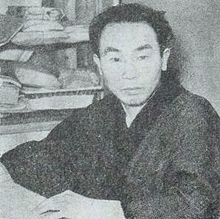Jirō Nitta
- View a machine-translated version of the Japanese article.
- Machine translation, like DeepL or Google Translate, is a useful starting point for translations, but translators must revise errors as necessary and confirm that the translation is accurate, rather than simply copy-pasting machine-translated text into the English Wikipedia.
- Consider adding a topic to this template: there are already 3,677 articles in the main category, and specifying
|topic=will aid in categorization. - Do not translate text that appears unreliable or low-quality. If possible, verify the text with references provided in the foreign-language article.
- You must provide copyright attribution in the edit summary accompanying your translation by providing an interlanguage link to the source of your translation. A model attribution edit summary is
Content in this edit is translated from the existing Japanese Wikipedia article at [[:ja:新田次郎]]; see its history for attribution. - You may also add the template
{{Translated|ja|新田次郎}}to the talk page. - For more guidance, see Wikipedia:Translation.
Jirō Nitta 新田 次郎 | |
|---|---|
 Jirō c. 1956 | |
| Born | Hiroto Fujiwara 藤原 寛人 (1912-06-06)June 6, 1912 Suwa, Nagano Prefecture, Japan |
| Died | February 15, 1980(1980-02-15) (aged 67) Musashino, Tokyo, Japan |
| Occupation | Novelist |
| Nationality | Japanese |
| Notable awards | Naoki Prize Medal with Purple Ribbon Order of the Rising Sun, 4th class |
| Children | Masahiko Fujiwara (son) |
| Relatives | Sakuhei Fujiwara (uncle) |
 Literature portal Literature portal | |
Jirō Nitta (新田 次郎, Nitta Jirō, June 6, 1912 – February 15, 1980) is the pen name of popular Japanese historical novelist Hiroto Fujiwara (藤原 寛人, Fujiwara Hiroto). He was born in an area that is now part of the city of Suwa, Nagano Prefecture, Japan.[1]
Career
His uncle was the famed meteorologist Sakuhei Fujiwara and his son is mathematician Masahiko Fujiwara. After retiring from the Japan Meteorological Agency, he began writing professionally. Originally a meteorologist, he wrote mainly on themes connected with mountains.
At least three of his documentary novels have been translated into English. Death March on Mount Hakkōda (八甲田山死の彷徨, Hakkōdasan shi no hōkō) is based on an incident in 1902 in the Hakkōda Mountains. Alaskan Tale (アラスカ物語, Arasuka monogatari) is about the adventures of Frank Yasuda.
Phantom Immigrants (密航船水安丸, Mikōsen Suianmaru, lit. "Stowaway-ship Suianmaru"; translated by David Sulz) deals with the Meiji era entrepreneur, Jinzaburo Oikawa (及川 甚三郎, Oikawa Jinzaburō) from northern Miyagi prefecture, who went to Canada in 1896 to export salmon roe back to Japan. In 1906, he chartered the schooner Suianmaru to smuggle 82 fellow villagers out of Japan and into Canada. They were apprehended and arrested on Vancouver Island without passports but allowed to stay in Canada thanks to negotiations by Saburo Yoshie (吉江 三郎, Yoshie Saburō) (aka Fred Yoshy) of the Japanese consulate in Vancouver.
His 1973 two-volume novel Kokou no Hito (孤高の人) has been adapted into a manga series of the same title in which he is credited as writer.
References
- ^ Jirō Nitta Archived 2011-12-16 at the Wayback Machine. (in Japanese) Suwa City. Accessed July 25, 2010.
- v
- t
- e









